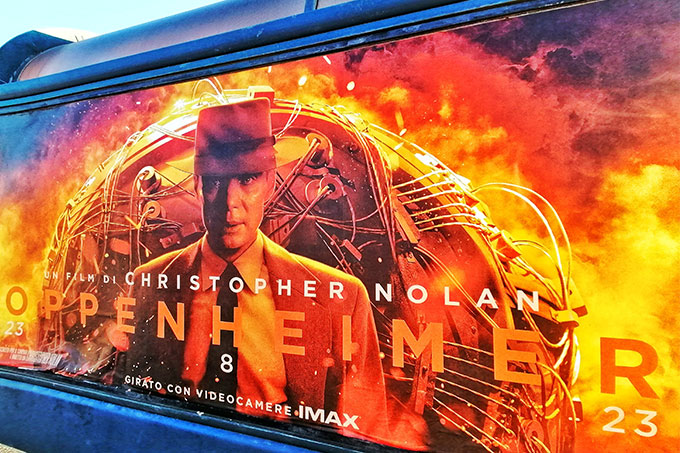Zulfi Ali explains how the recent release of blockbuster Oppenheimer should remind academics to take the lead in teaching about the horrors of nuclear war.
Christopher Nolan’s recently released biopic Oppenheimer, which is based on the life of J. Robert Oppenheimer, the American scientist also known as the ‘father of the atomic bomb’, is receiving an overwhelmingly enthusiastic reception. Critics are pointing to the film’s ambition, its ‘towering achievement’, and its ‘brilliance in both formal and conceptual terms’. Academics are weighing in to explain the science behind the film. Professor Brian Cox called it a ‘triumph, artistically but also intellectually’.
While Oppenheimer certainly raises the grossly neglected issue of nuclear weapons, let us be clear that it is not, as some critics have suggested, an anti-nuclear weapons film. It does not contextualise what happened in Hiroshima and Nagasaki by showing footage of human suffering (images of vapourised humans, of burning skin and melting flesh, of people dying where they stood at the moment of the explosions). Nor does it lead us to contemplate the generational consequences of the use of these weapons. It does not even dwell on the terrible legacy of the Trinity test on the Tularosa Basin Downwinders. The film does not encourage us to challenge the official Hiroshima narrative of the bomb ending the Second World War, nor does it tell us, despite the depiction of Oppenheimer’s moral struggles, that he defended the bombings of the Japanese cities until the end of his life.
The film gives us the illusion of addressing an existential crisis of our times, while preventing us from contemplating the issue with critical depth. This is Hollywood magic at its best, and we happily go along with it.
I think the academic community should seize this moment of renewed interest in nuclear weapons and remind ourselves of what is at stake: the complete and utter annihilation of human civilisation. If you find this a bit dramatic, consider that the nuclear arsenal owned by the USA alone is equal to 57,173 bombs of the size dropped on Hiroshima. How many times over do we need to destroy the planet?
Academics, whose job it is to fight historical amnesia, need to take a lead in educating on this subject, so that no one can claim ignorance. We need to amplify the warnings and remind everyone that earlier this year the Bulletin of Atomic Scientists moved the doomsday clock to 90 seconds to midnight, the closest we have been to global catastrophe. Around the same time, a study conducted by the Centre for the Study of Existential Risks at the University of Cambridge acknowledged that the risk of nuclear war has not been higher in the past few decades, and suggested that, “Public awareness of ‘nuclear winter’ is too low given current risks”. Last year, seventeen Nobel Laureates, including the Dalai Lama, wrote an open letter in which they reiterated their rejection of war and nuclear weapons, and urged the world to join in protecting the planet. “It is either the end of nuclear weapons, or the end of us”, they concluded.
The disjunction between the catastrophic consequences of nuclear war and public perceptions of that danger remains large and worrying. In 2019, the International Committee of the Red Cross conducted a survey of 16,000 millennials in 16 countries, and of the 12 issues on offer, nuclear weapons were the least concerning to the respondents, despite 80% saying they considered nuclear weapons a threat to humanity. We could be heading for death by ignorance.
Academics should start by deliberating on some obvious questions: How have we reached a stage of deafening silence on this existential threat? When and how did we decide that education could function solely as a business and remain meaningful simply through the pursuance of employability, with practically no link to the big issues of our time?
Universities need to be at the forefront of urgently, and with renewed energy, educating everyone about the horrifying threat of nuclear war. Academics should publicly and loudly refuse to sign up to normalising this evil, both directly and through silence. By reviving the discussion, ‘Oppenheimer’ has gifted us the opportunity to open new conversations, to imagine new ways of challenging the dominant narratives around nuclear weapons and to remind ourselves that it is still not too late to act. It is incumbent on us, who so eloquently speak of building sustainable futures and values-driven universities, and of striving for social justice, to stop and re-evaluate our values and re-imagine the role of education in these times of extraordinary crisis.
In 1998, following the nuclear tests in India and Pakistan, the Indian writer and activist Arundhati Roy declared that her world had died. For her, the tests were indefensible and signified what she called ‘the end of imagination’. She urged everyone, everywhere, to take it personally, and fight to prevent the horrors of nuclear war. Twenty-five years on, as I reflect on the growing threat of nuclear weapons today, her words still echo in my ears: “The nuclear bomb is the most anti-democratic, anti-national, anti-human, outright evil thing that man has ever made. If you are religious, then remember that this bomb is Man’s challenge to God. It’s worded quite simply: We have the power to destroy everything that You have created. If you’re not religious, then look at it this way. This world of ours is four thousand, six hundred million years old. It could end in an afternoon.”
I wonder what it will take for us to understand the horrors of the use of these weapons. What will it take for us to understand that once these weapons are used, we will not get a chance to learn from our mistakes?
I also wonder what it will take for us to stand up, be counted, and act?
Zulfi Ali is a Senior Lecturer in the School of Humanities and Educational Studies.
 Expert comment
Expert comment Jeanette Earl
Jeanette Earl 3625
3625


